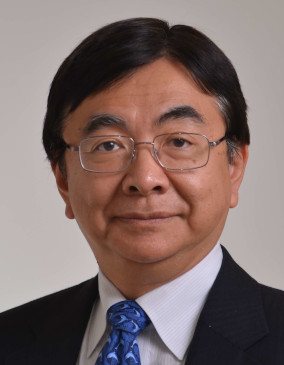Machine Learning and Photonic Devices
Dr. Keisuke Kojima, Fellow, IEEE, Fellow, Optica
This talk will provide an overview of deep learning applications in nanophotonic device design, focusing on generative neural networks. To achieve inverse design in nanophotonics, optimization of tens of thousands of 'pixels' is typically required. The adjoint method, a popular local optimization approach, often necessitates multiple optimization runs. Generative deep learning builds on existing data to generate new designs with specified target specifications such as transmission/reflection spectra. For instance, datasets optimized for discrete wavelengths (e.g., wavelength splitters) or splitting ratios (e.g., power splitters) can be used to generate devices with arbitrary wavelength or splitting ratios. We demonstrate examples using conditional variational autoencoders (CVAE) and denoising diffusion probabilistic models (DDPM) for applications in planar waveguide devices, metasurface gratings, and plasmonic gratings. Additionally, we introduce the concept of latent space optimization and transfer learning.
Date and Time
Location
Hosts
Registration
-
 Add Event to Calendar
Add Event to Calendar
- Contact Event Hosts
-
Dr. Naresh Chand, phone: 908 723 7001, nchand@ieee.org
Dr, Ajay K. Poddar, phone: 201 560 3806, akpoddar@ieee.org
Dr. Adriaan J. van Wijngaarden, phone: 973 738 3393, avw@ieee.org
Speakers
Keisuke of Boston Quantum Photonics LLC
Machine Learning and Photonic Devices
We first provide an overview of deep learning applications in nanophotonic device design, focusing on generative neural networks. To achieve inverse design in nanophotonics, optimization of tens of thousands of 'pixels' is typically required. The adjoint method, a popular local optimization approach, often necessitates multiple optimization runs. Generative deep learning builds on existing data to generate new designs with specified target specifications such as transmission/reflection spectra. For instance, datasets optimized for discrete wavelengths (e.g., wavelength splitters) or splitting ratios (e.g., power splitters) can be used to generate devices with arbitrary wavelength or splitting ratios. We demonstrate examples using conditional variational autoencoders (CVAE) and denoising diffusion probabilistic models (DDPM) for applications in planar waveguide devices, metasurface gratings, and plasmonic gratings. Additionally, we introduce the concept of latent space optimization and transfer learning.
Biography:
Keisuke Kojima has been working in the area photonic devices and optical communications over 40 years. He is an IEEE Fellow and a Fellow of Optica. He obtained his B.S., M.S., and Ph.D. degrees from the University of Tokyo, Japan, and an M.S. degree from the University of California, Berkeley. He spent eight years at Mitsubishi Electric in Japan, working on narrow linewidth/surface-emitting DFB and DBR lasers and optical neural networks. He then spent nine years at AT&T/Lucent Bell Laboratories covering research areas such as uncooled Fabry–Perot and DFB lasers, VCSELs, and passive optical network systems. In particular, he contributed the business growth of Lucent Microelectronics uncooled laser product line. From 2005 to 2021, he worked with Mitsubishi Electric Research Laboratories (MERL) in Cambridge, MA, focusing on designing nanophotonic devices using deep learning techniques and high-dimensional modulation for coherent optical systems. In 2022, he founded Boston Quantum Photonics LLC, a company dedicated to developing novel nanophononics devices for optical communications and quantum computing utilizing machine learning technology.
Dr. Kojima served as a chair of IEEE Photonics Society Boston Chapter between 2021 and 2022, and as an associate editor IEEE Journal of Lightwave Technology from 2020 until 2022.
Email:
Address:CEO, Boston Quantum Photonics LLC,, Boston, United States, 02493
Agenda
5:00 - 5:30 PM Assembly and buffet dinner
5:30 - 6:30 PM Presentation
6:00 - 7:00 PM Networking
All are welcome. Please register before the event such that the organizers have an approximate headcount. If you registered and are unable to attend, please cancel your registration.


